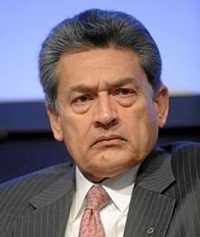SEC seeks $13.9m penalty, life ban on Rajat Gupta
22 Mar 2014
 The US capital market regulator, Securities and Exchange Commission, has asked an appeals court to affirm a district court's decision that Rajat Gupta, the former director of Goldman Sachs, pay a penalty of $13.9 million and be banned for life from serving as director of a public corporation.
The US capital market regulator, Securities and Exchange Commission, has asked an appeals court to affirm a district court's decision that Rajat Gupta, the former director of Goldman Sachs, pay a penalty of $13.9 million and be banned for life from serving as director of a public corporation.
In its brief filed in the US Court of Appeals for the Second Circuit, the federal regulator said the district court acted well within its discretion by permanently barring Gupta from associating with brokers, dealers, and investment advisors, so as to permanently enjoin him from violating the securities laws.
SEC also sought a permanent bar on 65-year-old Gupta from serving as an officer or director of a public company. SEC has given Gupta time till 7 April to file his reply.
Gupta had, in November last year, asked the appeals court to overturn the district court's decision that ordered him to pay the $13.9 million penalty in the insider trading case filed against him by the SEC.
The SEC took Gupta to court alleging that he had helped hedge-fund manager Raj Rajaratnam make over $4.6 million in gains by trading on tips Gupta allegedly passed on to him.
Gupta's lawyers had argued that the district court "abused" its discretion in imposing the statutory maximum civil penalty of $13.9 million, which is three times the $4.6 million in alleged gains made by Raj Rajaratnam.
The lawyers said the penalty was excessive in light of Gupta already facing a five-million-dollar fine and two year prison sentence in the criminal insider trading case.
The SEC said the district court was right in ordering that Gupta pay the maximum statutory civil penalty and that the court did consider whether to reduce the civil penalty in light of penalties imposed in the prior criminal case, ''but exercised its discretion to decline such a reduction."
SEC's lawyers, on the other hand, said, "specifically, the court found that Gupta had violated the securities laws with a high degree of scienter [a legal term that refers to intent or knowledge of wrongdoing], that his violations were egregious, repeated, and resulted, in effect, in millions of dollars of losses to those who traded their stock without the benefit of Gupta's inside information, and that Gupta's current financial condition does not counsel against the imposition of a civil penalty of the level that the SEC seeks."
The SEC said that imposing the maximum civil penalty is justified as it will ensure a "meaningful deterrent" effect given Gupta's wealth, and the aggravating facts that his tipping arose from his role in the securities industry and resulted in substantial investor losses."
The district court recognised that given Gupta's "rise to the pinnacle of his profession" as head of global consulting firm McKinsey and his "nearly unparalleled level of access to upper echelons of corporate executives" throughout the world "creates the risk that, notwithstanding his fall from grace, he remains well-placed to repeat his misconduct in the future.
"Enjoining Gupta from further securities law violations was a permissible exercise of discretion given Gupta's securities fraud conviction. Barring Gupta from serving as an officer or director was also reasonable because Gupta's tipping of inside information he obtained as a director was an egregious abuse of trust that demonstrates his lack of fitness to serve in that capacity. And enjoining Gupta from associating with brokers, dealers, or investment advisors is appropriate because Gupta's conviction arose out of his association with Goldman Sachs, the holding company of a constellation of broker-dealers and investment advisors," the SEC said, adding that the judgment of the district court should be affirmed.
Gupta's lawyers have argued that instead of protecting the investing public, the injunctions imposed on him by the district court "serve only to punish and stigmatise Gupta".



















